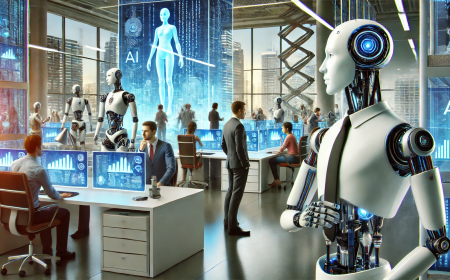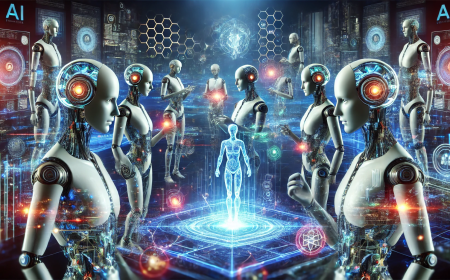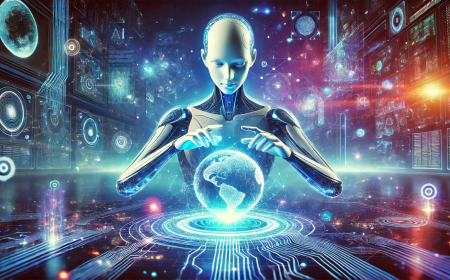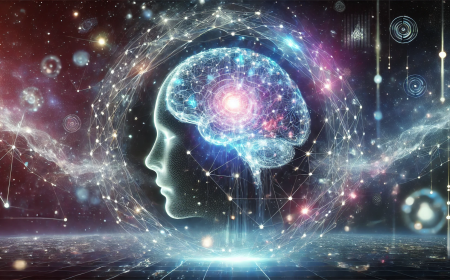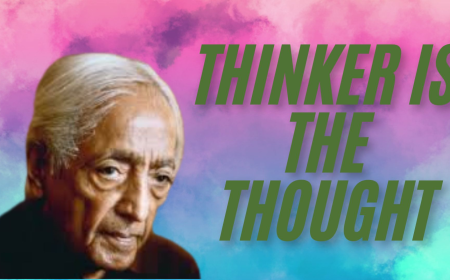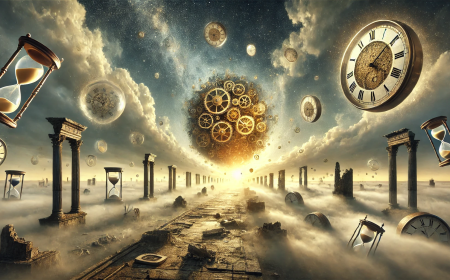The Impact of AI on Jobs: Future Trends, Disruptions & Opportunities
rtificial Intelligence (AI) is transforming industries, automating tasks, and reshaping the job market. While some jobs will be replaced, AI is also creating new career opportunities. In this in-depth guide, we explore how AI will impact different industries, what jobs are at risk, and how you can future-proof your career by acquiring essential AI-related skills. Learn about the ethical implications of AI, economic effects, and the new roles AI is generating in the workforce.
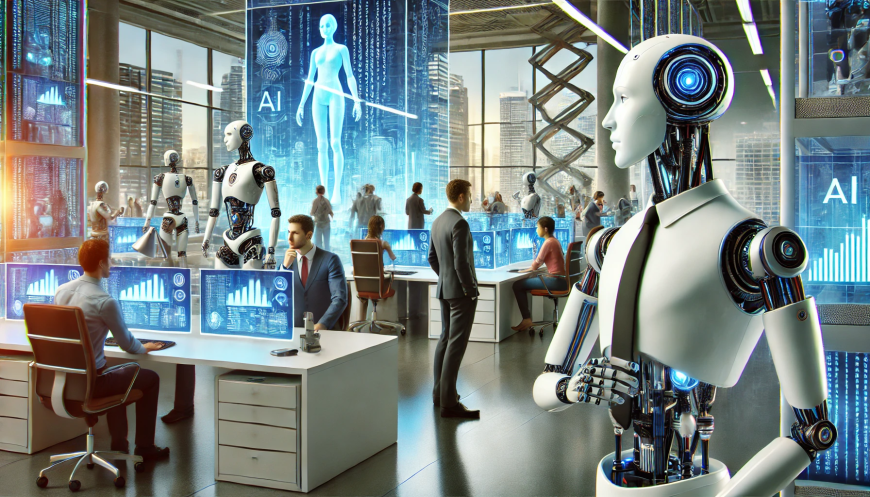
Artificial Intelligence (AI) is transforming industries at an unprecedented pace. While it raises concerns about job displacement, it also opens doors to new career opportunities and economic growth. In this blog, we'll explore how AI affects jobs, which roles are at risk, and how to future-proof your career in the AI-driven world.
1. How Will AI Affect My Job?
AI will reshape jobs in three primary ways:
- Automation of Routine Tasks – AI can handle repetitive, predictable tasks more efficiently than humans.
- Augmentation of Human Roles – AI will assist professionals by improving productivity, not necessarily replacing them.
- Creation of New Roles – AI will generate demand for new skills and job roles that don’t exist today.
➡️ Who is most affected?
- Jobs with high automation potential (e.g., data entry, manufacturing).
- Roles that involve creativity, strategy, or human interaction will be enhanced, not replaced.
2. What Jobs Will AI Replace in the Future?
AI is most likely to replace jobs that involve repetitive and rule-based tasks. Some examples include:
???? Blue-Collar Jobs at Risk:
- Manufacturing & Assembly Line Workers (Robots already perform repetitive tasks in factories).
- Truck Drivers & Delivery Personnel (Self-driving vehicles threaten traditional transport jobs).
- Warehouse Workers (AI-powered automation is replacing manual sorting & packing).
???? White-Collar Jobs at Risk:
- Data Entry Clerks (AI can process vast amounts of data instantly).
- Telemarketers (AI chatbots and voice assistants handle customer interactions).
- Bookkeepers & Accountants (AI automates calculations, invoicing, and payroll).
???? Customer Service Jobs at Risk:
- Call Center Agents (AI-powered chatbots handle customer queries).
- Retail Cashiers (Automated checkout systems are replacing human cashiers).
3. What New Jobs Will AI Create?
While AI will eliminate some jobs, it will create new career opportunities in emerging fields. Some of the most in-demand AI-driven careers include:
???? AI & Tech-Driven Roles:
- AI & Machine Learning Engineers – Develop AI models and algorithms.
- Data Scientists & Analysts – Extract insights from big data.
- Cybersecurity Experts – Protect AI systems from cyber threats.
???? Human-Centric Roles Enhanced by AI:
- AI Ethics Specialists – Ensure AI is used responsibly.
- AI-Assisted Medical Professionals – Use AI for diagnosis & treatment.
- AI-Enhanced Creatives – Writers, artists, and designers using AI tools.
???? Emerging AI-Related Careers:
- Prompt Engineers – Specialize in crafting AI prompts.
- AI Trainers – Teach AI models using real-world data.
- AI Integration Consultants – Help businesses adopt AI technology.
4. How to Prepare for AI Job Displacement?
If you're concerned about AI taking over your job, the best defense is upskilling and adaptability. Here’s how to stay relevant in the AI era:
- Develop Technical Skills: Learn AI-related fields like machine learning, data analysis, and automation.
- Enhance Soft Skills: Focus on creativity, emotional intelligence, and critical thinking—skills AI cannot replicate.
- Embrace Continuous Learning: Take online courses, attend workshops, and earn certifications.
- Adapt to AI Tools: Learn how to work alongside AI rather than compete with it.
5. What Skills Are Needed for AI Jobs?
To succeed in an AI-driven world, mastering the following skills will be crucial:
???? Technical Skills for AI Careers:
✅ Programming – Python, R, C++ (for AI and machine learning development).
✅ Data Science & Analytics – Understanding large datasets.
✅ Machine Learning & AI Development – Building AI models.
✅ Cybersecurity – Protecting AI-powered systems.
???? Soft Skills to Stay Relevant:
✅ Critical Thinking – Solving complex problems AI can’t handle.
✅ Creativity – Thinking outside the box.
✅ Emotional Intelligence – AI lacks human empathy and intuition.
✅ Collaboration – Working with AI as a tool rather than fearing it.
6. What Industries Will Be Most Affected by AI Automation?
???? Industries with High AI Impact:
- Manufacturing – AI-powered robots streamline production.
- Healthcare – AI assists in diagnostics, research, and robotic surgeries.
- Finance – AI automates trading, fraud detection, and risk management.
- Retail – Automated checkout and personalized recommendations.
???? Industries with Low AI Impact:
- Creative Professions – Art, music, writing (AI assists but doesn’t replace creativity).
- Healthcare & Therapy – AI can’t replace human connection and intuition.
- Education – Teachers and mentors are still needed for personalized learning.
7. AI’s Impact on Different Job Sectors
???? AI’s Impact on Blue-Collar Jobs
✅ AI will automate repetitive physical tasks (e.g., warehouse operations).
✅ New jobs in robotics maintenance and AI monitoring will emerge.
???? AI’s Impact on White-Collar Jobs
✅ AI will replace routine data-processing roles (e.g., accounting, legal research).
✅ Professionals who use AI as an assistant will thrive.
???? AI’s Impact on Customer Service Jobs
✅ AI chatbots will handle basic customer queries.
✅ Human agents will focus on complex issues requiring empathy.
8. How Does AI Affect the Economy and Jobs?
???? Positive Economic Effects of AI:
✅ Increased Productivity – AI automates repetitive tasks, allowing workers to focus on high-value activities.
✅ New Job Creation – AI-related fields will expand job opportunities.
✅ Business Growth – AI-driven innovation creates new markets.
???? Negative Economic Effects of AI:
❌ Job Displacement – Routine jobs will decline.
❌ Wage Inequality – High-skilled workers benefit more than low-skilled workers.
9. Ethical Impact of AI on Jobs
AI raises significant ethical concerns, including:
- Job Displacement vs. Fair Transition – How do we support workers who lose jobs to AI?
- Bias in AI Hiring – AI-based hiring tools may reinforce discrimination.
- Worker Surveillance – AI monitoring systems may invade privacy.
Conclusion: Preparing for an AI-Driven Future
AI is not the end of jobs but a shift in how we work. By embracing lifelong learning, adapting to new roles, and developing uniquely human skills, we can thrive in an AI-powered world.
???? Future-Proof Your Career! Start learning AI-related skills and stay ahead of the technological curve!
What's Your Reaction?












